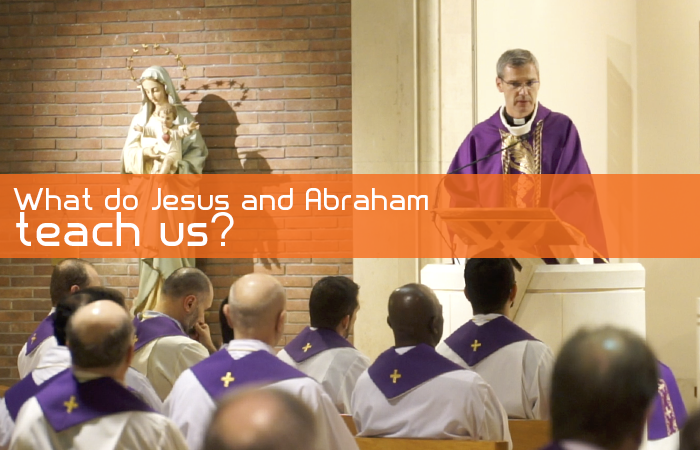
The texts we chose invite us to set our eyes on two main themes and to open our hearts to two important subjects: meditation and migration.
Very early in the morning, while it was still dark, Jesus went to a desolate place, and there he prayed. The days before he had been very busy with healing Peter’s mother-in-law. He met many people who were possessed by evil spirits and he healed the sick. He traveled from one village to another, from one encounter to another. Now he needed silence and solitude. He needed a framework to meet his Father in heaven.
He was longing for prayer and meditation. During his meditation he brought himself with his own wounded heart, his troubled mind, the suffering of the people, and the many questions about this world into a new harmony. This harmony was given to him through a deep meditation, in a way that his Father in Heaven could gently touch his heart and calm his troubled mind. Shortly after that night, Jesus set off for Kafarnaum where he healed a paralyzed man.
If we have a quick look at the structure of this dynamic of Jesus’ life: Jesus healed, he meditated profoundly and he was on his way, like an itinerant, to heal again. In that respect he was walking in the steps of his ancestor Abraham. When Abraham, a migrant from Ur in Chaldea, met the three men, he was already an old man – and he and his wife Sarah – were childless. But Abraham had a deep trust in God. He prayed and he meditated all his life.
In a way, Abraham lived like us. Abraham reminds us of the situation we, the sons of Father Leo Dehon, find very often in our own context: Abraham was a monotheist in a pagan society. Many of us live in a society where secularism and atheism are moving forward. Some of us live in a society where Christians are threatened and persecuted.
Abraham invites us to do as he did: spread the name of God wherever he traveled. Abraham saw himself on a mission from God. It seems that the purpose of the tree he planted, the grove, was to provide hospitality for travelers and migrants and to spread his belief in God throughout the ancient pagan world.
Looking at Abraham with the eyes of Jesus, we can learn a lot to help our Congregation of the Priests of the Sacred Heart of Jesus. Abraham not only had a vision but he was able to communicate this vision to descendants living hundreds of generations later.
Abraham cared about people and had a strong sense of justice. He was the first person to tithe his possessions (Genesis 14:20). Abraham was extremely hospitable to strangers.
On one hot day, he was sitting at his tent’s entrance and noticed three strangers. He ran towards them and invited them to come to his home and “wash their feet” and eat a “morsel of bread.” In actuality, he provided them with freshly baked bread, curd and milk, and a tender calf. Moreover, Abraham stood over them and acted as host and waiter. Abraham was an elderly man, yet the Bible states (Genesis 18:6, 18:7): “And Abraham hastened to the tent…” “Abraham ran to the cattle.”
When the three men left, (Genesis 18:16): “Abraham went with them to send them on their way.” Abraham even showed his guests the courtesy of accompanying them part of the way. His nephew, Lot, showed this same hospitality in Sodom, a place that violently opposed treating strangers with hospitality.
Abraham and Sarah were childless and both of them suffered for not having children. Their generosity, their strong sense of hospitality and justice changed it all. One year after the visit of the three men, Sarah was pregnant with Isaak.
What do Jesus and Abraham teach us at the beginning of this Major Superiors’ meeting?
As Sons of Father Dehon we need a strong spirituality.
We have to develop our devotion to the Sacred Heart of Jesus.
We need time for silence, solitude and prayer.
We need a desolate place to meditate on the beauty of God’s creation.
We need a strong sense of meditation.
Every one of us is in need of a spiritual director, of someone who advises us, who helps us to set out on the road to God. We need – as our Holy Father Pope Francis says – a “missionary mysticism”. “The missionary has to be a contemplative in action.” We need a personal and intimate friendship with the Lord. (EG 35; Annunciate 17).
Besides meditation we have to open ourselves to the world of migration. The phenomena of migration will challenge our Church and our Congregation in the 21st century. First of all, migration is not a problem, it is a challenge. We need migration. Without migration we become closed in upon ourselves, in the narrow-minded world of our own ideas, in the short-sighted vision of our lives. Meeting people, opening up our communities, as Abraham and Sarah did – will enrich us, and will bear fruit.
However, migration can cause a world of suffering as well. As Priests of the Sacred Heart, we have to enter this world of pain, grief and sorrow. We stand by the side of the victims. As disciples of Jesus we meet people who suffer from the loss of their homes, their countries. We listen to those who suffer from broken relationships. We see the rejected. Being open to margins of our societies, means being open to the wounded Heart of Jesus.
Let us do then as Abraham and Jesus did: Let our hearts, our minds and our actions be open for meditation and migration.
Amen.
Genesis 18:1-15 (Abraham and the three visitors at Mamre)
Mark 1:35-39 (Jesus went out to a desolate place and prayed)


